11 High-Paying Entry-Level IT Jobs No Experience Needed [2025]
Updated December 14, 2024
Published April 24, 2024
![11 High-Paying Entry-Level IT Jobs No Experience Needed [2025]](https://cdn.sanity.io/images/isy356iq/production/a584a8509851806c0fe3504520c8eeb5c40e6d7c-1200x800.jpg?h=260)
Are you a recent graduate or considering a career change?
If you’re interested in diving into the IT industry, you’re in the right place.
This guide highlights 11 high-paying entry-level IT jobs no experience needed, with perfect for those new to the tech scene or shifting from another career, all achievable without prior experience.
You’ll learn about various roles, from Software Developers to Data Scientists, along with their median salaries and current job market trends.
Whether you’re just stepping out of academia or transitioning from a different field, this blog equips you with the necessary information to swiftly and effectively start a rewarding career in IT.
11 Entry-Level IT Jobs Salaries and Growth Trends
| Entry-Level IT Jobs | Median Salary | Growth Trends |
|---|---|---|
| Data Scientist | $122.738 | 35% |
| UX Designer | $98.206 | 13% |
| Web Devs & Designers | $92,750 | 16% |
| Operations Analysts | $67,409 | 23% |
| Help Desk Technician | $49,506 | 5% |
| Network & System Admins | $100.393 | 2% |
| InfoSec Analysts | $120.369 | 32% |
| Database Admins & Architects | $131,381 | 8% |
| Cloud Support Specialists | $90.479 | 13% |
| Digital Marketing Specialist | $76,988 | 13% |
| Software Devs & QA Testers | $84.571 | 25% |
11 High-Paying Entry-Level IT Jobs No Experience Needed
Data Scientist
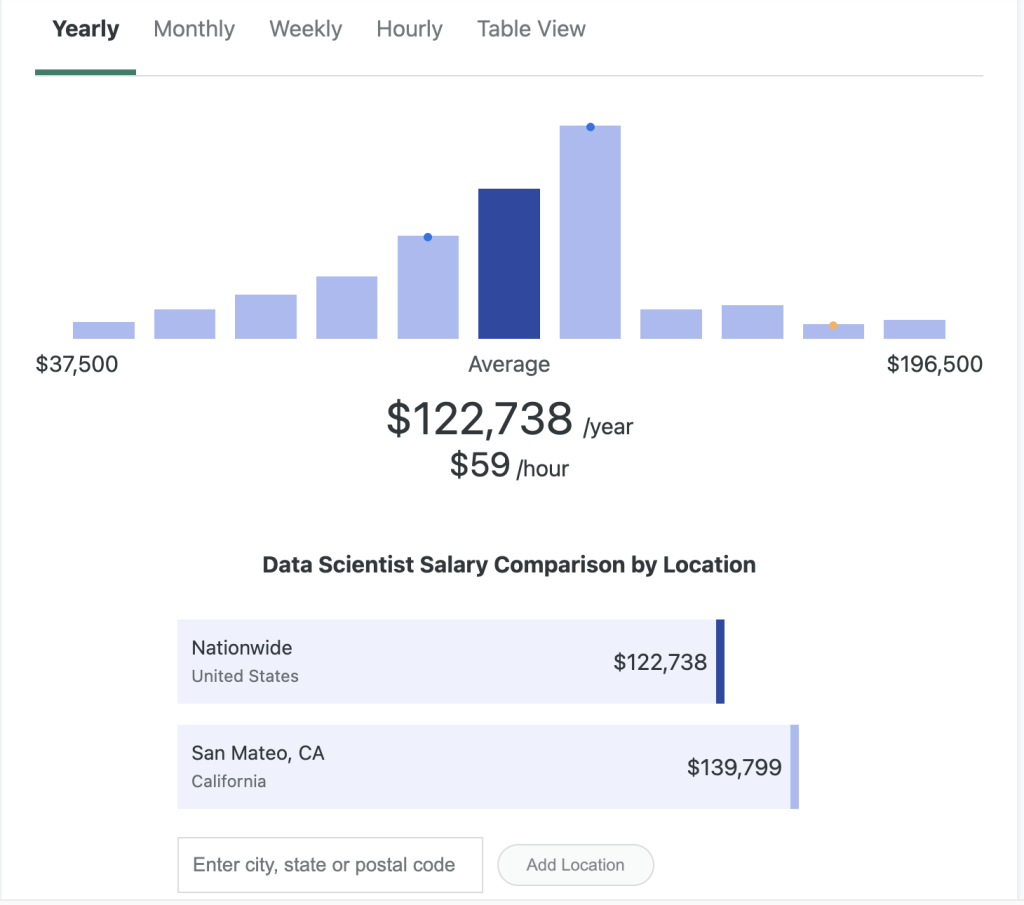
Median Salary: $122.738
Pay Range: $38k – $197k
Job Market Trends: Projected to grow by 35 percent from 2022 to 2032
A Data Scientist analyzes and interprets complex digital data to aid in business decision-making. They utilize statistical and machine learning techniques, programming skills, and an understanding of the business context to extract meaningful insights from data.
Entry-level Data Scientists are expected to immerse themselves in diverse learning experiences, support seasoned team members, and undertake projects that foster their professional growth and enhance their portfolios.
User Experience (UX) Designer
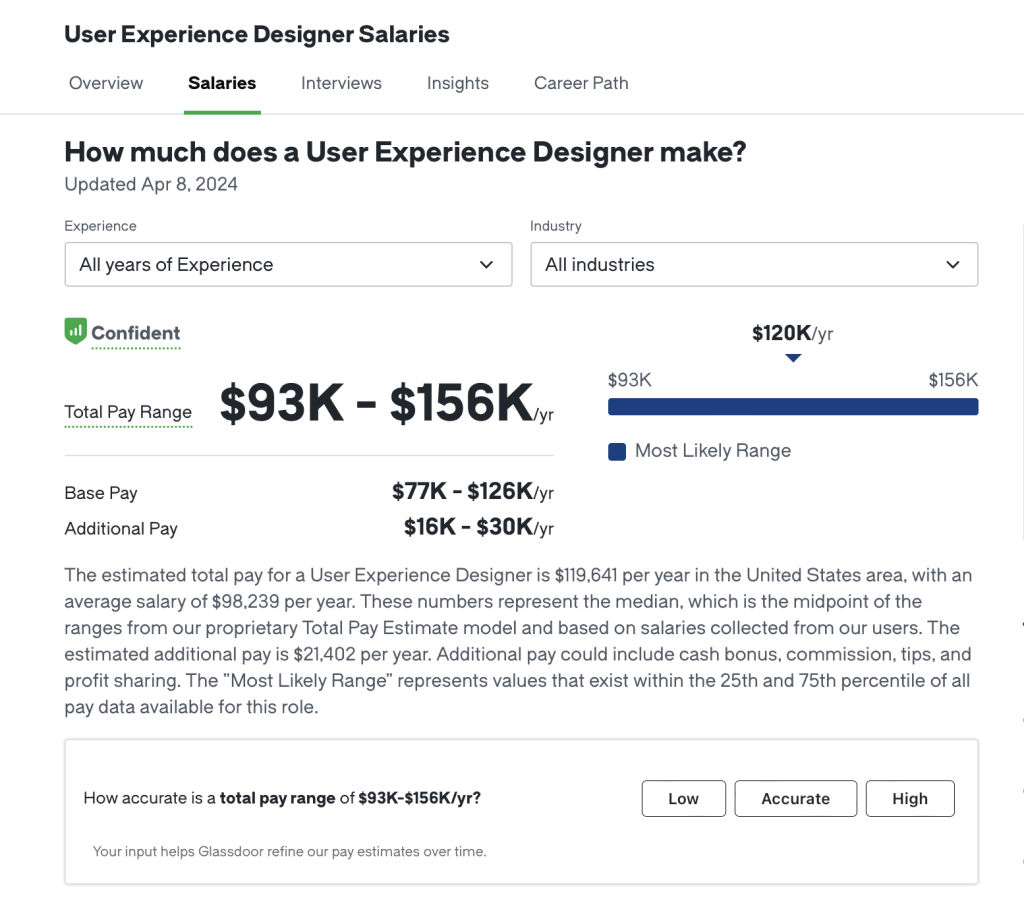
Median Salary: $98.206
Pay Range: $93k – 156k
Job Market Trends: Projected to grow by 13 percent from 2021 to 2027
A User Experience (UX) Designer focuses on creating meaningful and relevant interactions with digital products such as websites and applications. By understanding user behaviors, needs, and motivations through research, they design user experiences that are intuitive, efficient, and enjoyable.
At the entry-level, UX Designers engage in a variety of learning experiences, support senior team members, and take on projects that enhance their professional growth and contribute to the development of their portfolios.
Web Developers and Digital Designers
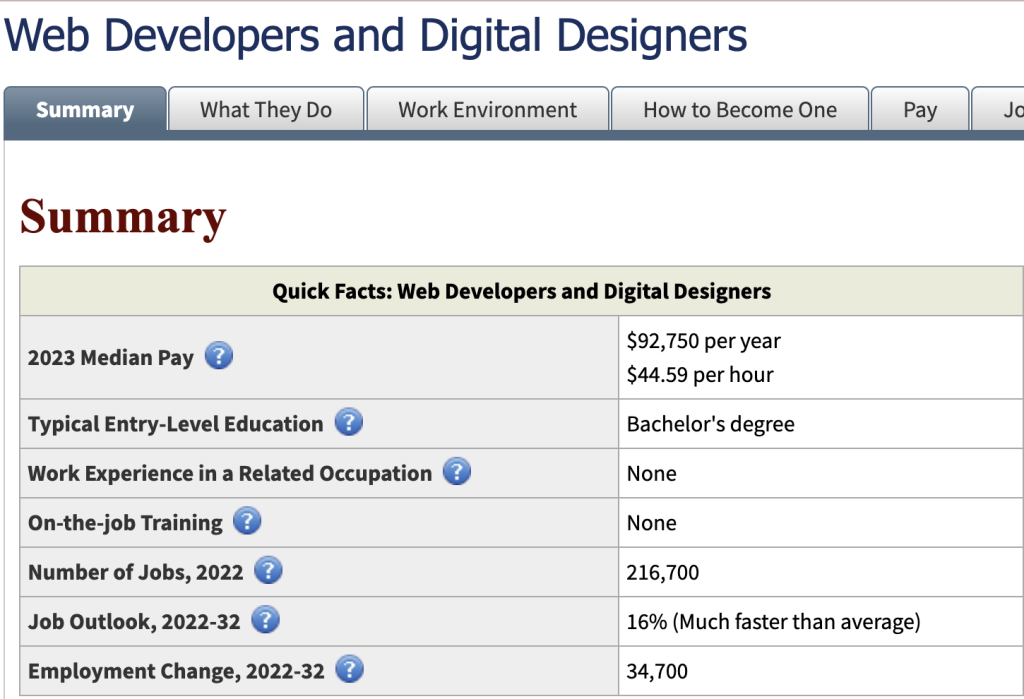
Median Salary: $92,750
Pay Range: $60.053 – $ 78, 574
Job Market Trends: Projected to grow by 16 percent from 2022 to 2032
Web developers design, create, and maintain websites, ensuring they function correctly and meet user needs. They manage site performance, implement features, and fix bugs.
Development is categorized into front-end (client-side) and back-end (server-side), with some developers specializing in one area while others, known as full-stack developers, handle both.
Web developers focus on the technical aspects of website development, while digital designers handle the visual components of digital media. Entry-level roles in both fields require substantial learning and progressively involve more complex responsibilities as skills and experience develop.
Operations Research Analysts
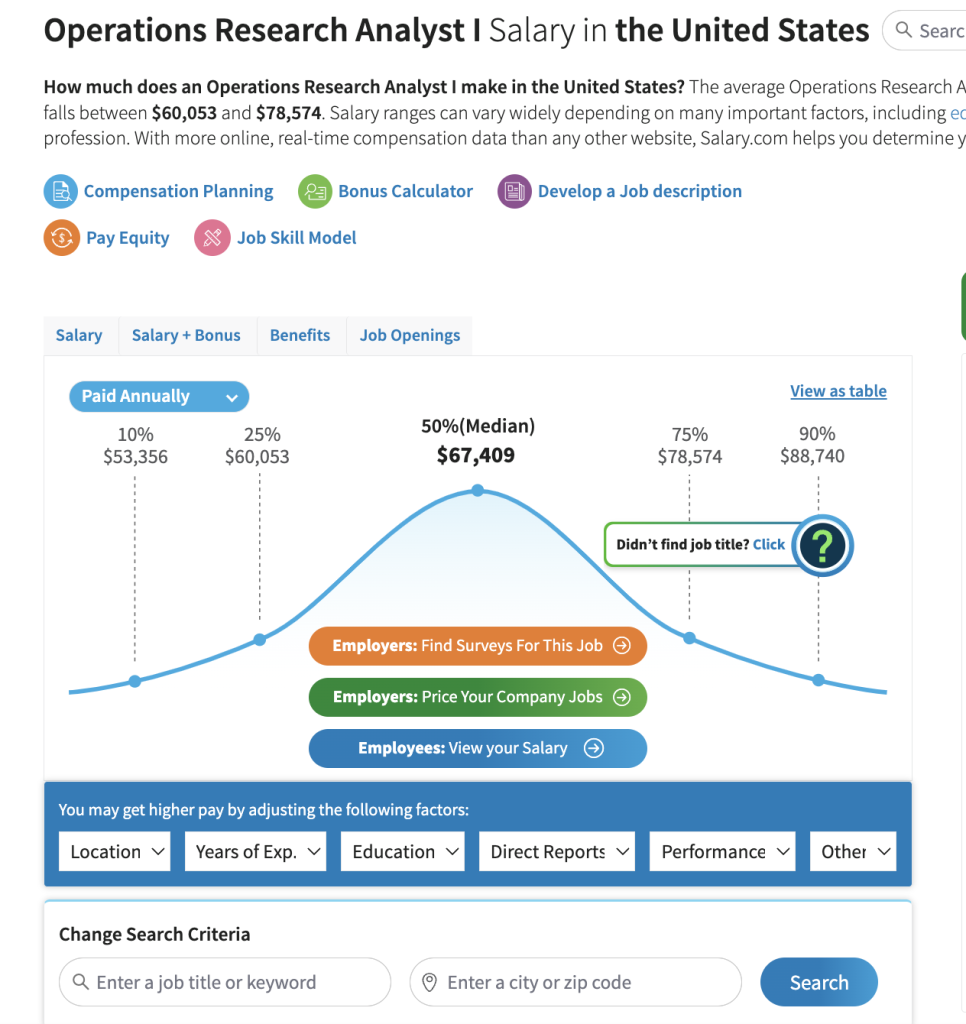
Median Salary: $67,409
Pay Range: $60.053 – $ 78, 574
Job Market Trends: Projected to grow by 23 percent from 2021 to 2031
Operations Research Analysts are professionals who utilize advanced mathematical and analytical methods to improve decision-making, optimize efficiency, and solve complex problems in organizations.
At the entry-level, these analysts start with basic tasks and, over time, take on increasingly complex responsibilities. They develop their skills in data analysis, modeling, and problem-solving through a combination of formal training and hands-on experience, progressively enhancing their ability to contribute to organizational performance.
Help Desk Technician
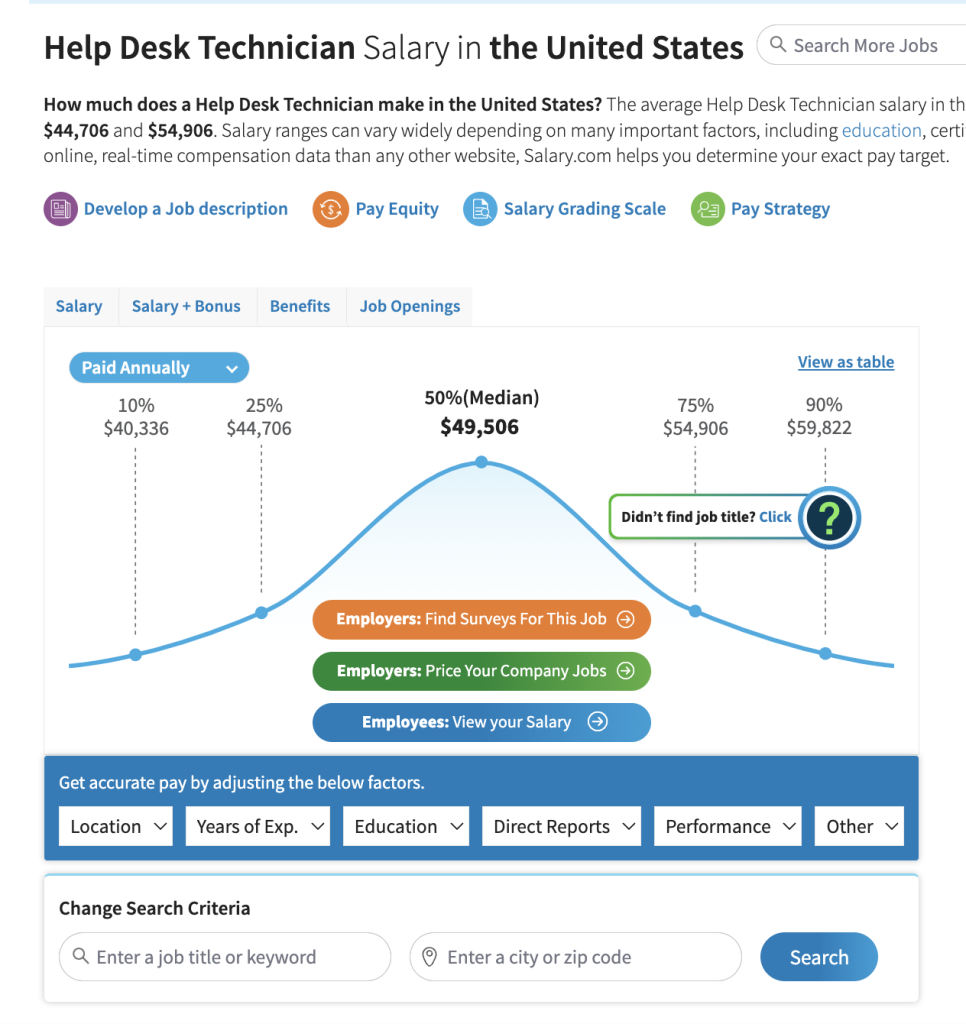
Median Salary: $49,506
Pay Range: $44.706 -$54,906
Job Market Trends: Projected to grow by 5 percent from 2022 to 2032
A Help Desk Technician is an IT support specialist who resolves technical issues related to computer systems, hardware, and software. This role is essential for ensuring the smooth operation of IT functions and maintaining company productivity.
As an entry-level Help Desk Technician, you will start by learning basic troubleshooting and gradually take on more complex tasks. This position is ideal for individuals with a strong interest in technology and customer service, providing a foundational career path in IT.
Network and Computer Systems Administrators
Median Salary: $100.393
Pay Range: $77k – $132k
Job Market Trends: Projected to grow 2 percent from 2022 to 2032
Network and Computer Systems Administrators are IT professionals responsible for managing and supporting an organization’s computer networks, which include LANs, WANs, network segments, intranets, and other data communication systems.
Those entering the field at an entry-level should expect to begin with foundational tasks, progressively taking on more complex responsibilities as they enhance their skills and deepen their understanding of the organization’s network infrastructure.
Information Security Analysts
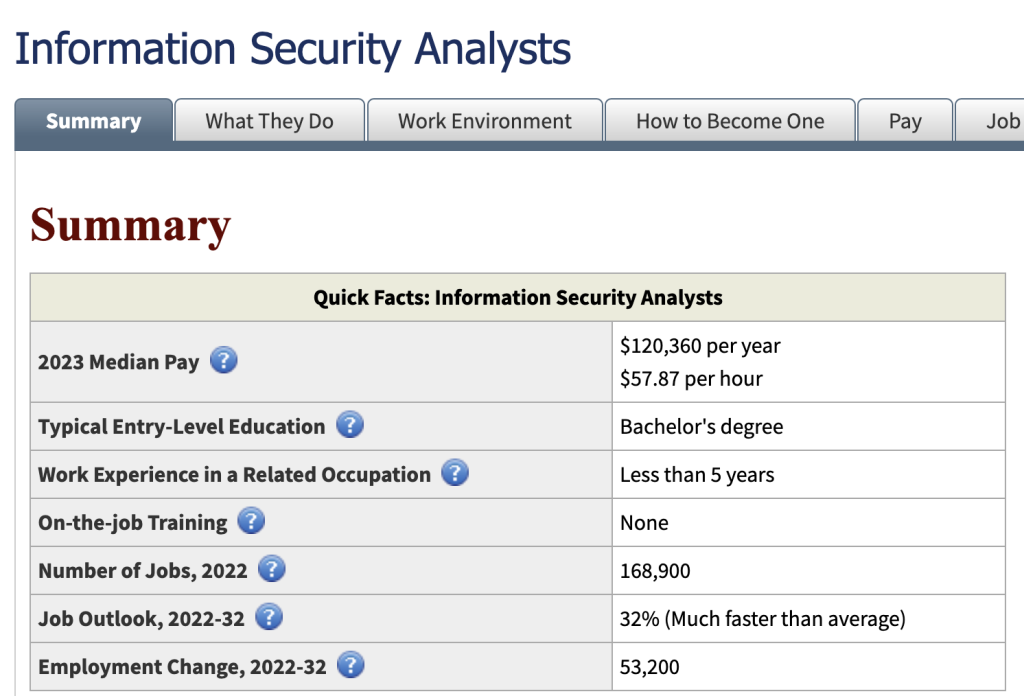
Median Salary: $120.369
Pay Range: $100K – $150K
Job Market Trends: Projected to grow 32 percent from 2022 to 2032
An Information Security Analyst protects an organization’s computer systems and networks from cyber threats. This role involves implementing security measures to guard sensitive data against unauthorized access and cyberattacks.
An entry-level Information Security Analyst must continuously learn and adapt to evolving technologies and threats. This role offers a pathway to advanced cybersecurity positions based on individual growth and learning.
Network and Computer Systems Administrators are IT professionals responsible for managing and supporting an organization’s computer networks, which include LANs, WANs, network segments, intranets, and other data communication systems.
Those entering the field at an entry-level should expect to begin with foundational tasks, progressively taking on more complex responsibilities as they enhance their skills and deepen their understanding of the organization’s network infrastructure.
Database Administrator and Architects
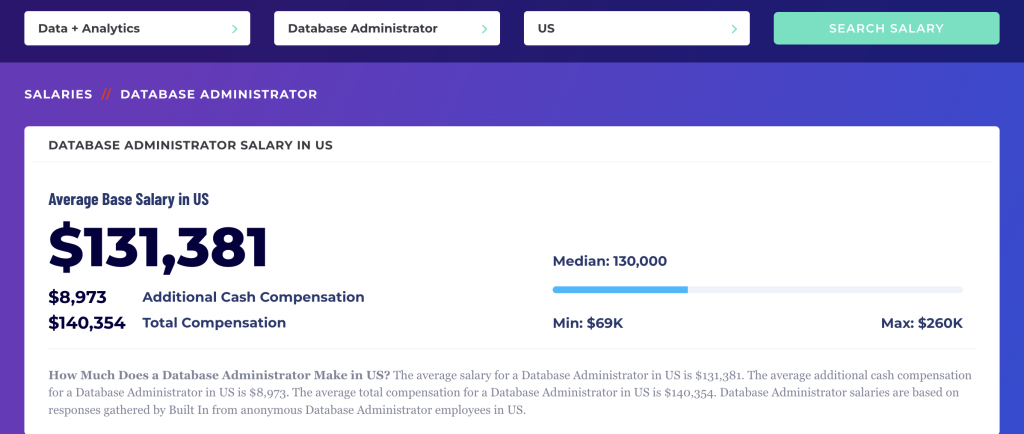
Median Salary: $131,381
Pay Range: $69k – $260k
Job Market Trends: Projected to grow 8 percent from 2022 to 2032
DBAs ensure databases operate efficiently, focusing on maintenance, security, backups, and performance optimization. Architects design databases to be efficient and scalable, working with stakeholders to convert business needs into technical specifications. Both roles are key to maintaining data integrity and security to meet organizational requirements.
As an entry-level professional in database work, expect a steep learning curve and comprehensive on-the-job training. You’ll handle tasks ranging from routine maintenance to database design and implementation, supported by mentorship from experienced colleagues.
Cloud Support Specialists
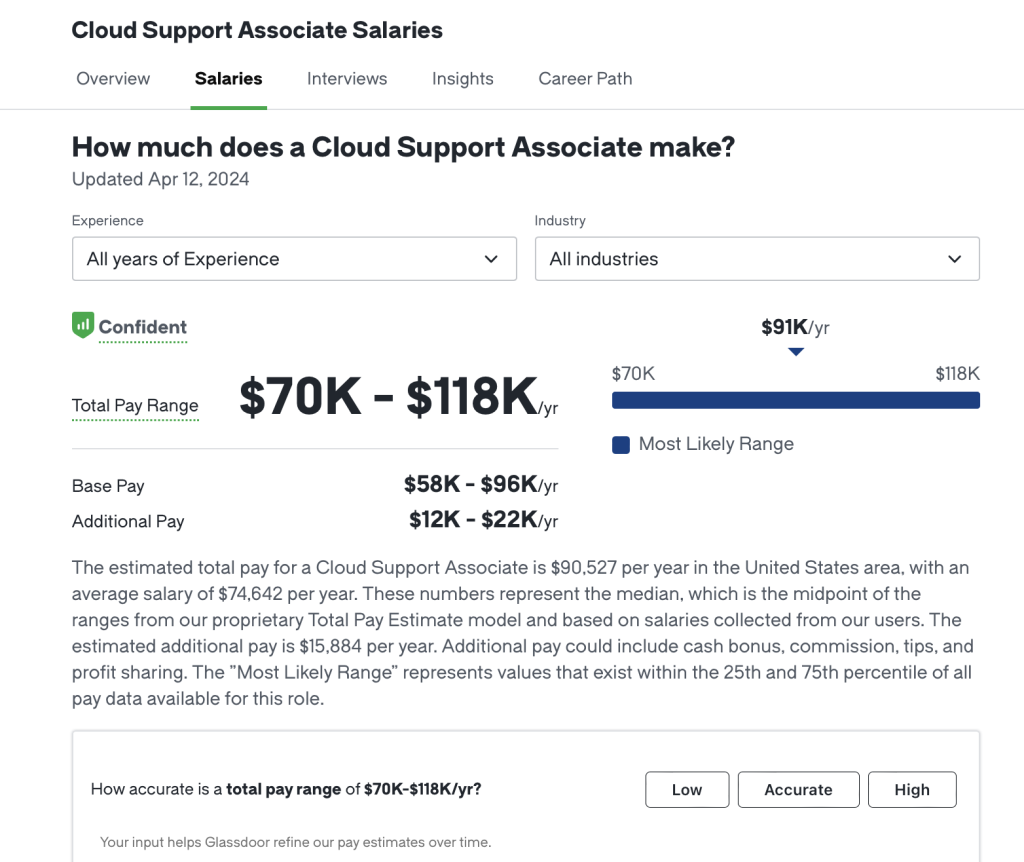
Median Salary: $90.479
Pay Range: $70k – $118k
Job Market Trends: Projected to grow 13 percent from 2020 to 2030
A Cloud Support Specialist is a professional who provides technical support and assistance for cloud computing services. This role typically involves troubleshooting and resolving issues related to cloud infrastructure, platforms, and software applications.
As an entry-level Cloud Support Specialist, you’ll start by learning cloud computing basics and your employer’s specific technologies. Under experienced colleagues’ guidance, you’ll manage basic support tasks and customer queries.
As you gain skills, you’ll tackle more complex responsibilities and may pursue further training and certifications. Although most cloud computing roles require foundational IT knowledge, some companies provide training for motivated beginners. Expect a steep learning curve as you advance in this evolving field.
Digital Marketing Specialist

Median Salary: $76,988
Pay Range: $69,365k – $86,637k
Job Market Trends: Projected to grow 13 percent from 2022 to 2032
Database Administrators and Architects focus on managing, designing, and optimizing databases to ensure they operate efficiently, securely, and are accessible to users.
Entry-level professionals often start by learning their organization’s specific systems and best practices, including tasks like documenting database configurations and procedures. As they gain experience, entry-level workers can expect to handle more complex responsibilities over time.
While these positions may not require extensive experience but typically require a bachelor’s degree in computer science or a related field, gaining certifications in specific database technologies can also enhance career prospects.
Software Developers, Quality Assurance Analysts, and Testers
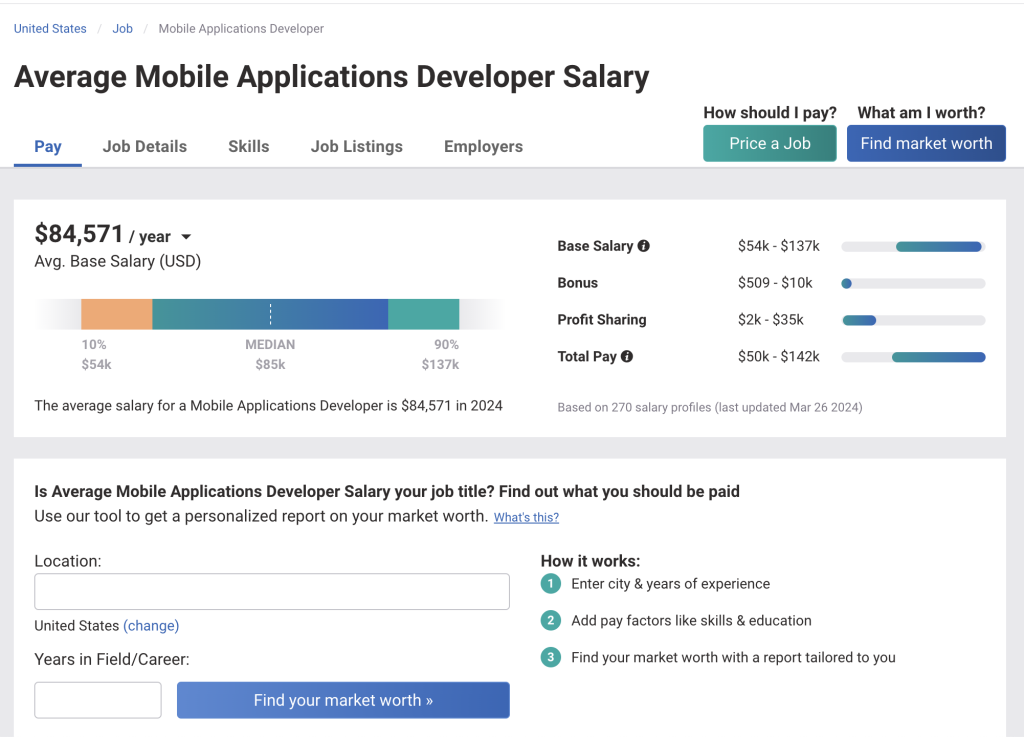
Median Salary: $84.571
Pay Range: $54K – $137K
Job Market Trends: Projected to grow 25 percent from 2022 to 2032
Software Developers, Quality Assurance Analysts, and Testers are professionals who ensure that software applications are effective, secure, and ready for users.
Software Developers are involved in designing, coding, and modifying software through all stages of the development lifecycle, from initial design to final implementation.
Quality Assurance Analysts focus on testing software to ensure it functions properly and adheres to quality standards, identifying and documenting bugs to prevent issues like data loss or security breaches.
Testers are dedicated to running tests to detect software bugs, ensuring that the software is both reliable and user-friendly before it is released. Together, these professionals ensure that software applications are effective, secure, and ready for users.
Entry-level for these positions typically include on-the-job training to build necessary technical skills and knowledge. Continual learning is essential due to the rapid evolution of technology.
the Advantages of Pursuing a Career in IT
To start a career in entry-level IT jobs without prior experience, a structured approach can help you build a solid foundation and increase your chances of success.
High Earning Potential
IT jobs offer competitive salaries from the start, with the demand for skilled professionals ensuring higher wages compared to many other sectors. Additionally, large companies often provide extensive benefits, including excellent health coverage, enhancing the overall appeal and financial security of IT careers.
Diverse Career Opportunities
The IT sector provides a variety of career paths, including software development, data analysis, cybersecurity, and cloud computing. This diversity allows individuals to explore niche areas that align with their interests and skills, leading to a more fulfilling career trajectory.
Flexibility and Work-Life Balanc
Many IT roles feature flexible working conditions, such as the option to work remotely. This flexibility is highly valued, particularly among those who prioritize family time, hobbies, or travel, contributing to a better work-life balance.
Continuous Learning and Advancement
Given the rapid evolution of technology, continuous learning and professional development are essential in IT. This dynamic environment keeps work engaging and ensures IT professionals remain at the cutting edge of technology, enhancing their value in the job market.
Job Security
Technology plays a critical role in modern business operations, leading to a consistent demand for IT professionals. The IT sector is less likely to experience large-scale layoffs compared to other industries, offering a level of job security that attracts many job seekers.
Impact and Innovation
IT professionals often contribute to projects with significant impacts on business operations and daily life. They can take pride in driving innovations that enhance productivity and convenience for users globally.
Global Opportunities
IT skills are universally applicable, allowing professionals to find opportunities both locally and internationally. This global reach provides unique career experiences and cultural exchanges that enhance personal growth and professional development.
These benefits make a career in IT highly attractive and rewarding, offering both personal and professional growth opportunities in a sector that is essential to the modern digital economy.
5 Tips on How to Kickstart Your IT Career
Embarking on an IT career can be thrilling yet challenging due to the field’s dynamic nature. To effectively navigate this ever-evolving tech landscape, leverage our five structured tips to kickstart your journey:
Commit to Continuous Learning
The technology sector is marked by rapid changes and advancements. Staying current is essential, so immerse yourself in ongoing education. This might involve keeping up with emerging technologies like cloud-native solutions, learning about containerization, or mastering complex tools like Kubernetes. Continuously updating your skills makes you a valuable candidate in the IT job market.
Challenge Yourself Regularly
Stepping out of your comfort zone is key to professional growth. Engage in projects that stretch your capabilities, whether that’s through leading new initiatives at work, contributing to open-source projects, or exploring new technologies during your personal time. Pushing the boundaries of your knowledge and skills ensures continuous growth and prevents complacency.
Expand Your Professional Network
Networking is crucial for career progression. Build relationships with colleagues, mentors, and leaders in the industry by engaging on professional networking sites, attending local tech meetups, and participating in conferences. These connections can offer valuable industry insights, career guidance, and potential job opportunities.
Develop Essential Soft Skills
Technical skills are vital, but soft skills are equally important for a well-rounded IT professional. Skills like effective communication, problem-solving, and adaptability are indispensable for working in teams, managing projects, and handling complex workplace dynamics. Develop these skills through practice, constructive feedback, and training programs.
Gain Practical Experience
Practical experiences such as internships, online courses, or volunteer projects are crucial for showcasing your skills to potential employers. These opportunities not only enhance your resume but also provide real-world applications of your theoretical knowledge, making you a more attractive candidate in the competitive IT job market.
Using these tips , you lay a solid foundation for a robust IT career. Remember, the cornerstone of success in technology is the proactive pursuit of knowledge and the flexibility to adapt to new challenges and opportunities.
Final Thoughts
As we conclude this guide, it’s clear that the IT industry offers a promising start for anyone eager to enter the tech world. Focus on developing the key skills discussed for each role and actively seek out opportunities to gain the necessary experience. This straightforward approach will prepare you to successfully enter and thrive in the IT field.
Frequently Asked Questions
Share This Post
Alex Powell
Alex Powell is a senior tech and business media writer with a passion for breaking down complex tech topics into easy-to-understand information. He holds a degree in Business Administration and a master's in Journalism. When he's not writing, Alex enjoys hiking and reading books.
Allow cookies
This website uses cookies to enhance the user experience and for essential analytics purposes. By continuing to use the site, you agree to our use of cookies.


![The Ultimate Guide to ChatGPT Prompt Engineering [2025]](https://cdn.sanity.io/images/isy356iq/production/36ced462704fe9d4b5b1779fe622b74b1b728421-2560x1656.jpg?h=200)

![How to Become a Professional AI Developer? [2025]](https://cdn.sanity.io/images/isy356iq/production/9fd66e97b4189371f4660b6cf7cea90fbc102db3-1200x800.jpg?h=200)